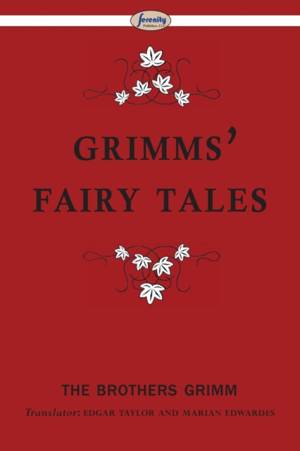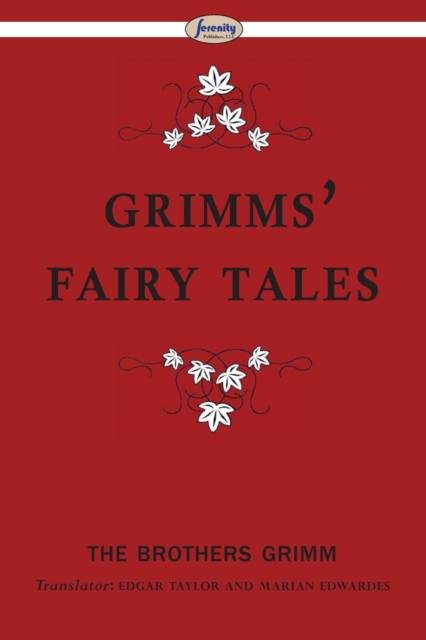
- Retrait gratuit dans votre magasin Club
- 7.000.000 titres dans notre catalogue
- Payer en toute sécurité
- Toujours un magasin près de chez vous
- Retrait gratuit dans votre magasin Club
- 7.000.000 titres dans notre catalogue
- Payer en toute sécurité
- Toujours un magasin près de chez vous
Description
Grimms' Fairy Tales, originally known as the Children's and Household Tales (German: Kinder- und Hausmärchen, pronounced [ˌkɪndɐ ʔʊnt ˈhaʊsmɛːɐ̯çən]), is a collection of fairy tales by the Grimm brothers or "Brothers Grimm", Jakob and Wilhelm, first published on 20 December 1812. The first edition contained 86 stories, and by the seventh edition in 1857, had 210 unique fairy tales. Jacob and Wilhelm Grimm were two of eight children from their mother Dorothea (Née Zimmer) and father Philipp Wilhelm Grimm. Philipp was a highly regarded district magistrate in Steinau, near Kassel. Jacob and Wilhelm were sent to school for a classical education once they were of age, while their father was working. They were very hard-working pupils throughout their education. They followed in their father's footsteps and started to pursue a degree in law. However, in 1796, their father died at the age of 44 from pneumonia. This was a tragic time for the Grimms because the family lost all financial support and relied on their aunt, Henriette Zimmer, and grandfather, Johanne Hermann Zimmer. At the age of 11, Jacob was compelled to be head of the household and provide for his family. After down-sizing their home because of financial reasons, Henriette sent Jacob and Wilhelm to study at the prestigious high school, Lyzeum, in Kassel. In school, their grandfather wrote to them saying that because of their current situation, they needed to apply themselves industriously to secure their future welfare.Shortly after attending Lyzeum, their grandfather died and they were again left to themselves to support their family in the future. The two became intent on becoming the best students at Lyzeum, since they wanted to live up to their deceased father. They studied more than twelve hours a day and established similar work habits. They also shared the same bed and room at school. After four years of rigorous schooling, Jacob graduated head of his class in 1802. Wilhelm contracted asthma and scarlet fever, which delayed his graduation by one year although he was also head of his class. Both were given special dispensations for studying law at the University of Marburg. They particularly needed this dispensation because their social standing at the time was not high enough to have normal admittance. University of Marburg was a small, 200-person university where most students were more interested in activities other than schooling. Most of the students received stipends even though they were the richest in the state. The Grimms did not receive any stipends because of their social standing; however, they were not upset by it since it kept the distractions away.
Spécifications
Parties prenantes
- Auteur(s) :
- Editeur:
Contenu
- Nombre de pages :
- 236
- Langue:
- Anglais
Caractéristiques
- EAN:
- 9781612428628
- Date de parution :
- 24-04-15
- Format:
- Livre broché
- Format numérique:
- Trade paperback (VS)
- Dimensions :
- 156 mm x 234 mm
- Poids :
- 335 g







